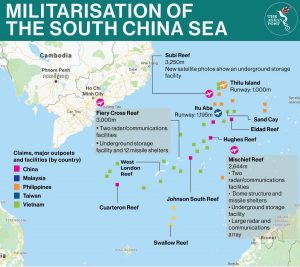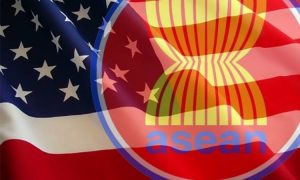The Association of Southeast Asian Nations (ASEAN) should show some urgency regarding China’s latest actions in the South China Sea and hold a virtual meeting with member states to discuss this matter.
Amid the spread of the COVID-19 virus in Southeast Asia, ASEAN member states are busy battling the virus while China is actively building its presence in the occupied territories.
In March, China launched two new research stations on the Chinese-built artificial islands at Fiery Cross Reef and Subi Reef. Officials stated that they are under the Integrated Research Center for Reefs and Islands at the Chinese Academy of Sciences, and described their purpose as the study of a wide range of marine sciences, including the ecology, geology, environment, mineral, and energy resources of the South China Sea.
However, the research stations are alleged to be part of China’s plans in ramping-up its exploitation of the deep-sea environment in its search for fuel, rare metals and biotechnology in the waters, according to maritime experts.
They also said the launching of these stations is not acceptable as the 2016 Arbitral Tribunal ruling against China’s activities in the South China Sea have deemed the islands as artificial and claims by China that they are part of its exclusive economic zone are illegal.
Malaysian Waters
China has also been very active in Malaysian waters recently.
The Malaysian coast guard confirmed the presence of the Haiyang Dizhi 8, a Chinese survey ship. Vessel-tracking software also showed the ship operating close to an exploration vessel contracted by Malaysia’s state-owned oil company, PETRONAS. The survey activity was just inside Malaysia’s exclusive economic zone.
According to media reports, the Haiyang Dizhi 8 entered Malaysian waters and was seen close to the West Capella, an exploration vessel owned by Petronas. From the sinking of a Vietnamese fishing boat to the Haiyang Dizhi 8 survey vessel encroaching in claimants’ territories, Beijing is intensifying its occupation of the South China Sea.
The Haiyang Dizhi 8 survey vessel’s travels, since it left port at Sanya on Hainan Island on 9 April, shows it went through Vietnamese waters and entered the waters of Malaysia and Brunei on 17 April.
This latest flashpoint in the South China Sea is getting more attention and is seen as a new move by China. Beijing has established two districts to manage – the Spratly Islands and Paracel. Media reports claim that Beijing has moved to tighten its grip over the South China Sea by setting up new administrative structures in the disputed waters.
It was reported that the two new districts will be under the authority of the local government in Sansha, a city in the southern island of Hainan. The new districts will govern the Paracel and Macclesfield Bank – an area claimed by Vietnam and Taiwan – and the Spratly Islands and their adjacent waters, where there are multiple overlapping claims.
While China is carrying out its expansion in the South China Sea, there has been an outcry by international analysts and governments.
The United States (US) State Department released a statement on 6 April, calling on China “to remain focused on supporting international efforts to combat the global pandemic”.
US Spokeswoman, Morgan Ortagus described it as “the latest in a long string of PRC actions to assert unlawful maritime claims and disadvantage its Southeast Asian neighbours in the South China Sea.”
She said the US shares the position of the 2016 Law of the Sea tribunal decision that dismissed China’s maritime claims to the area. “We call on the PRC to remain focused on supporting international efforts to combat the global pandemic, and to stop exploiting the distraction or vulnerability of other states to expand its unlawful claims in the South China Sea.”
In an emailed statement on 18 April, the US State Department expressed its concern at reports of China’s repeated provocative actions aimed at the offshore oil and gas development of other claimant states. It said in this instance, China should cease its bullying behaviour and refrain from engaging in this type of provocative and destabilising activity.
Vietnam, the current ASEAN chair, has protested the latest moves by China. Vietnam’s Foreign Ministry spokeswoman, Le Thi Thu Hang, said that the establishment of the so-called Sansha City and related activities violated Vietnam’s sovereignty.
She said Vietnam demands that China respect Vietnam’s sovereignty and abolish its wrongful decisions.
Former Foreign Secretary of the Philippines, Albert Del Rosario urged authorities to protest China’s establishment of two districts aimed at exerting control over the South China Sea.

In a statement, he also accused China of exploiting the new coronavirus pandemic to advance its “illegal” claims in the waters.
Other experts have also condemned China’s activities in the South China Sea.
In a comment on Twitter, Collin Koh, a Research Fellow at the Institute of Defense and Strategic Studies (RSIS) stressed that China is taking advantage of the pandemic plight of ASEAN parties in the South China Sea to assert its claims.
He ticked-off Beijing for picking a fight with Malaysia, a country which has been consistent in prioritising broader bilateral relations over South China Sea issues. He believes China is violating Southeast Asia sovereignty and rights in the South China Sea.
Politic analyst Carl Thayer from the University of New South Wales called China’s latest action “provocative,” “illegal” and has no basis under international law.
He added that international law does not recognise sovereignty acquired through conquest. Beijing’s move also violates the Declaration on Conduct of Parties in the South China Sea (DOC) that was agreed to by China and ASEAN member states in 2002.
Thayer pointed out that Paragraph 5 of the DOC states that the Parties undertake to exercise self-restraint in the conduct of activities that would complicate or escalate disputes and affect peace and stability in the South China Sea.
He also said China’s unilateral actions seriously complicate the dispute and affects peace and stability in the region.
He warned that China’s declaration of a new administrative district in the Spratly Islands “is a pre-emptive move to push aside sovereignty claims by Vietnam and the Philippines.”
Why Does ASEAN Have To React?
While Chinese actions defy international and sea laws guiding the exclusive economic zones of every country in the South China Sea, ASEAN must act to prevent the colonisation of the seas by China.
In order to prevent such an escalation, ASEAN member states who are claimants in the South China Sea should call for an urgent meeting and step up efforts to deal with the unfolding situation.
All 10 ASEAN member states should play a central role in resolving conflicts and de-escalating tensions. ASEAN has to be united when addressing regional issues.

Internationally, the US, India, Japan and Australia also realise the need to contain Beijing’s activities and the importance of strengthening ASEAN.
India and the US have understood the need for the Quad as was made clear in a joint statement in February 2020 by Modi and Trump. They also stressed that the code of conduct (COC) should “not prejudice the legitimate rights and interests of all nations according to international law” and that ASEAN’s centrality in the Indo-Pacific should be maintained.
In an environment of escalating conflict in the South China Sea, the regional bloc should call on stakeholders to practice restraint, avoid the most stressful escalation and comply with international law, especially the United Nations Convention for the Law of the Sea (UNCLOS) and the DOC.
ASEAN member states should find ways to solve this standoff. One way is for ASEAN and Chinese officials to speed up the process of finalising the COC for the South China Sea, which experts say will ensure the code is “legally binding, meaningful, effective, and consistent with international law”. /.
Maria Angela, The Asean Post

Aufrufe: 444

 Deutsch
Deutsch Tiếng Việt
Tiếng Việt




